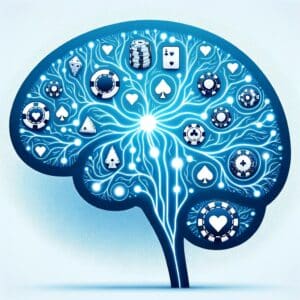 Millions enjoy a flutter without issue, yet the mental health stakes are real. Gambling’s grip on the brain warrants a closer look.
Millions enjoy a flutter without issue, yet the mental health stakes are real. Gambling’s grip on the brain warrants a closer look.
We peel back the layers on how gambling can rewire your neural circuitry, examining neurotransmitters, casino psychology, and the hooks of addiction.
Inside the Gambler’s Brain: A Neurological Guide
Place a bet, and your brain’s reward system springs into action, releasing a cocktail of chemicals that influence mood and behaviour.
Dopamine takes centre stage, delivering a pleasure punch with every win. Yet, it’s not a solo act. Serotonin, cortisol, and adrenaline join the fray. A deficit in serotonin can leave you vulnerable to addiction, as seen with lower levels in those grappling with problem gambling.
As stakes rise, so does cortisol, sharpening focus and adrenaline, fuelling the thrill. This hyperarousal keeps you chasing bets, even when losses mount.
Regular gambling can blunt dopamine’s buzz, pushing you to seek bigger risks. Plus, the constant chemical barrage poses health risks, particularly for those with existing conditions.
Grasping these neurological shifts is vital to managing gambling’s risks and enjoying casino games and sports bets responsibly.
Psychological Tactics in Online Gambling
Just like in-person gambling, wagering online can give you a thrilling yet safe experience. However, as slots, table games, or sports bets can take you on a rollercoaster of emotions, they can cloud your judgment and lower your impulse control.
Internet casinos are adept at crafting environments that subtly influence your betting behaviour. Just like physical venues, a symphony of vivid visuals, alluring sounds, and intricate game dynamics work together to create an environment that’s hard to step away from. Slot machines are particularly notorious for disguising losses as near-misses, enticing you to keep the reels spinning.
Online slots often turn minor wins into grand celebrations, instilling an inflated sense of achievement. This clever sensory deception directly targets your brain’s reward system, making you feel like a winner amidst losses, a dangerous path that can lead to addiction.
Being aware of these digital deceptions is critical, not just for players but for regulators, emphasising the need for responsible gambling practices and measures to protect mental health.
Spotting and Tackling Gambling Addiction
Pathological gambling is a behavioural addiction that can grip you with an insatiable urge to gamble, a problem that’s more widespread than you might think, touching millions across the UK.
Consistent gambling can rewire the brain in ways akin to drug addiction, reinforcing neural pathways that perpetuate the cycle of addiction. This can diminish your ability to resist the urge to gamble, even when the consequences are dire.
It’s the prefrontal cortex, the brain’s decision-making hub, that takes a hit, leading to compromised judgment. Meanwhile, the ventral striatum, which is central to the reward system, adapts in ways that heighten cravings and change your response to losses, making it tough to break the chains of addiction.
Spotting the early signs of gambling addiction is key to nipping it in the bud. Look out for an obsessive focus on gambling, spiralling bets, failed cessation attempts, and persistence in gambling despite negative repercussions. Awareness and early action from both individuals and their support circles are paramount.
Seeking professional help is a cornerstone in conquering gambling addiction. Addiction experts provide the support and tools needed to cut through the cycle of addiction and reclaim autonomy. Emphasising the need for expert intervention not only highlights the gravity of gambling addiction but also ensures that help is at hand for those who need it.
Smart Strategies for Safe Gambling
While gambling spells fun for many, it’s crucial to play it smart to sidestep potential downsides. Responsible gambling is about understanding the risks, setting solid boundaries, and staying vigilant against the snares of addiction.
Adopting firm limits on your funds and time dedicated to gambling is a savvy move. It’s about holding the reins tight and making choices with a clear head. Don’t forget to take regular pauses—these are your checkpoints to reassess and steer clear of hasty decisions.
Spotting addiction early – obsessive gambling thoughts, the urge to chase losses or sneaky betting habits – can be a game-changer. Swift action and reaching out for help pave the way for recovery.
Your support squad – be it friends, family, or trained professionals – can prevent you from gambling irresponsibly. There’s a wealth of confidential help out there, from helplines to support groups.
Boosting public savvy on gambling’s brain games is key to keeping bets safe. Awareness drives and educational outreach can arm you with the insights needed to gamble responsibly, ensuring it stays a leisurely pastime.
Wrapping Up: The Mind’s Gamble
The brain’s reward circuitry, easily swayed by gambling’s charm, can send you on an emotional rollercoaster, from highs to lows.
The mental maze of gambling is vast, shaping your mood, choices, and self-restraint. Casinos’ masterful setting and game design are meant to keep you in the game, while the mirage of ‘almost wins’ keeps the jackpot dream alive.
Addressing gambling addiction is critical—it reshapes crucial brain regions, trapping you in an addictive loop. Spotting the signs early and seeking expert intervention are key to breaking free. Embracing responsible gambling practices, recognising the red flags of addiction, and tapping into support networks are your best bets for staying in charge and on the path to recovery.
Vital Resources for Gambling Recovery
As we conclude our exploration of gambling’s impact on the brain, it’s essential to have access to robust support for recovery. We have an extensive list of expert guides to assist you and your loved ones on this journey:
- Recovery from Gambling Addiction: Begin your path away from gambling with this essential guide.
- Confronting Addiction Denial: Discover how to recognise and address denial in gambling addiction.
- Gamblers Anonymous: Peer Support: Find solidarity and support through Gamblers Anonymous.
- GamCare: Professional Support: Access expert advice and resources through GamCare.
- Activities to Break Free from Gambling: Engage in positive activities to divert your focus from gambling.
- Safeguarding Children from Gambling: Implement strategies to protect children from the risks of gambling.
- GAMSTOP: Self-Exclusion Assistance: Discover how GAMSTOP can aid in your self-exclusion efforts.
- Further Self-Exclusion Resources: Explore more tools to support your self-exclusion decision.
- Gamblock: Gambling Blocking Software: Use Gamblock to prevent access to gambling websites.
- BetBlocker: Online Gambling Blocker: Another robust software to restrict access to gambling online.
- Gamban: Comprehensive Device Protection: Shield all your devices from gambling content with Gamban.
- BetFilter: Stop Online Gambling: Employ BetFilter to cut out online gambling temptations.
- NetNanny: Secure Browsing: Ensure a safe online environment with NetNanny.
Arm yourself with these resources to construct a strong support network and gain the knowledge necessary to overcome gambling addiction.


